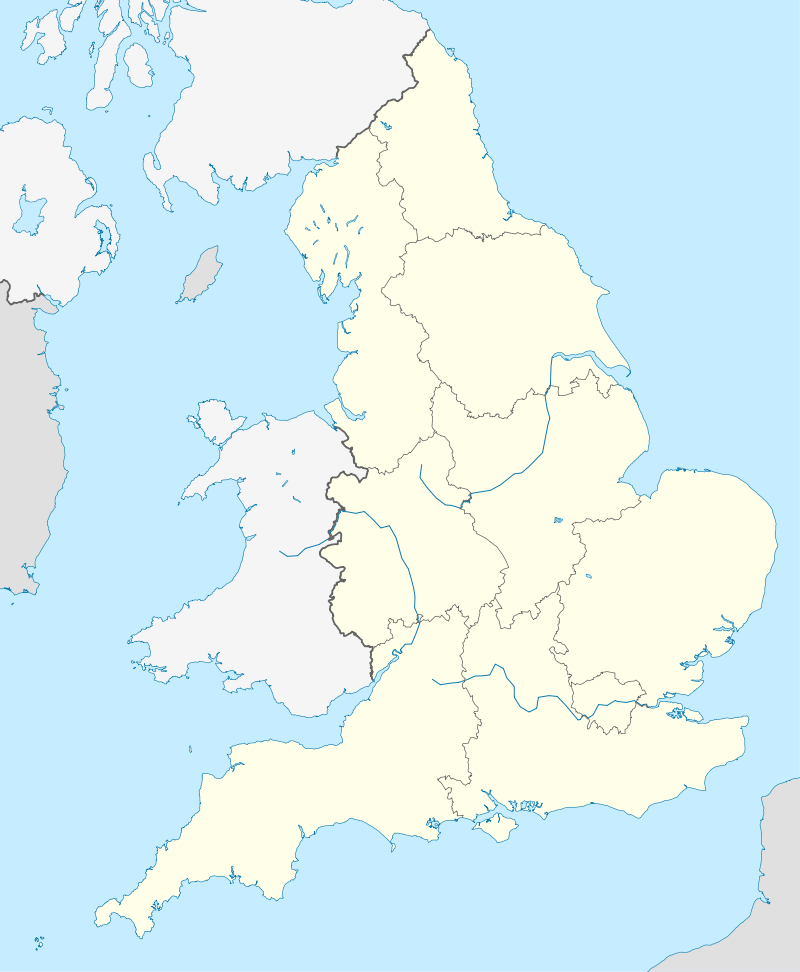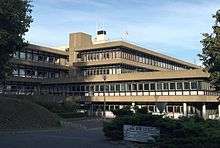Institute of Food Research
Coordinates: 52°37′26″N 1°13′28″E / 52.623820°N 1.224523°E
| Institute of Food Research | |
|---|---|
 Institute of Food Research | |
| OS grid reference | TG183077 |
| Abbreviation | IFR |
|---|---|
| Formation | 1968 |
| Legal status | Non-profit company and charity |
| Purpose | Food research in the United Kingdom |
| Location |
|
Region served | United Kingdom |
Membership | 146 scientists |
Director | Professor Ian Charles |
Main organ | IFR Governing Body |
| Website | IFR |

The Institute of Food Research (IFR) a British centre for research and training in food science and health. It is located in Norwich, England, United Kingdom and it is a member of the Norwich Research Park along with the John Innes Centre (JIC), the Earlham Institute, the local university, the University of East Anglia (UEA) and the Norfolk and Norwich University Hospital.[1] It is a registered charity (number 1058499)[2] and receives strategic funding from the Biotechnology and Biological Sciences Research Council.[3]
Foundation
The Institute of Food Research was created in 1968, when it was spread over four sites, the Meat Research Institute (MRI) at Langford near Bristol, the Food Research Institute (FRI) at Colney in Norwich, the National Institute for Research in Dairying (NIRD) in Shinfield, near Reading, and the Long Ashton Research Station (food related departments only of the last two). At the end of 1990, the Bristol laboratory was closed, and in 1992 the Reading laboratory was moved onto the campus of the University of Reading. In 1998, it was decided that the institute's activities should be consolidated in one location, Norwich, which was completed in September 1999.[4]
Current focus
IFR is the UK's only integrated basic science provider focused on food and is a world leading contributor to harnessing food for health and controlling food-related disease. The outcomes of its work feed into national and international strategies and deliver advice and solutions for UK Government, public sector bodies, regulatory authorities, industry and consumers.[5]
The science at the institute cover six areas of interest:[6]
- Gut health
- Food and Health
- Food safety
- Industrial biotechnology and the exploitation of food waste
- The National Collection of Yeast Cultures
- Food Databanks
The Institute of Food Research was ranked second in the world for the impact of its research in the area of agricultural and food sciences, according to an independent survey of published research papers released in 2009[7][8]
In 2018, research from IFR will transfer to The Quadram Institute, a new institute being constructed in partnership with the UEA and NNUH[9]
Science in Society
It was one of the hosts for the BA Festival of Science, along with UEA and JIC in September 2006.
Directors
The current director is Professor Ian Charles, who was appointed in 2015 following the retirement of Professor David Boxer.[10] The previous directors were Professors David White, Alastair Robertson, Peter Schroeder, Alan Malcolm, Peter Belton, Doug Georgala CBE and Frank Curtis.
References
- ↑ "Research Laboratories Norwich/ Nolfolk". www.norwichresearchpark.com. Retrieved 2016-07-13.
- ↑ "Charity overview". Retrieved 2016-07-13.
- ↑ Council, Biotechnology and Biological Sciences Research. "Strategically funded institutes - BBSRC". www.bbsrc.ac.uk. Retrieved 2016-07-13.
- ↑ Sponge, Creative. "A Short History of Food Research | Institute of Food Research". www.ifr.ac.uk. Retrieved 2016-07-13.
- ↑ http://www.ifr.ac.uk/About
- ↑ Sponge, Creative. "Research | Institute of Food Research". www.ifr.ac.uk. Retrieved 2016-07-13.
- ↑ http://www.thomsonreuters.com/products_services/scientific/Essential_Science_Indicators
- ↑ "Institute of Food Research 2nd in world ranking for impact of research publications". www.norwichresearchpark.com. Retrieved 2016-07-13.
- ↑ Shields, Mark. "In Pictures: First look at how Norwich's £81m research centre will look". Retrieved 2016-07-13.
- ↑ "Director of ithree institute appointed to head new Centre for Food & Health | University of Technology Sydney". www.uts.edu.au. Retrieved 2016-07-13.